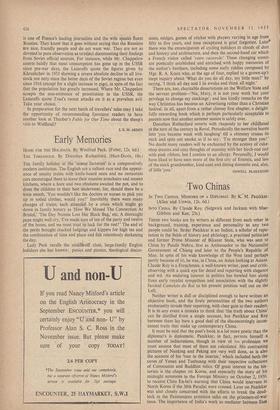Early Memories
THE family holiday at the `ozone factories' is a comparatively modern institution. The English are a valiant race and the appear- ance of smutty trains with knife-board seats and no restaurant cars encouraged them to leave their massive armchairs and unseen kitchens, where a hare and two chickens awaited the pot, and to dress the children in their best underwear, for, should there be a train smash, 'You wouldn't like the doctors or nurses to pick you up in soiled clothes, would you?' Inevitably there were many changes of trains, each attended by a crisis which might go ;down in family history as `How We Missed The Connection At ,Bristol,' The Day Nannie Lost Her Black Bag,' etc. A distraught papa might well cry, 'I've made sure of ten of the party and twelVe of the boxes, and we must trust to luck for the rest!' The end of the perils brought cracked lodgings and kippers for high tea and the combination of time and place and fish relentlessly darkening the day.
Lady Peck recalls the *middle-off class, large-family English holidays she has known: panics and picnics, theological discus-
sions, midges, games of cricket with players varying in age from fifty to five years, and time recaptured is grief forgotten. Later. there was the emancipation of cycling holidays in clouds of dust and history and architecture, and then the second-hand car which a French visitor called 'votre casserole.' These changing scenes are poetically established and enriched with happy memories of the author's brothers, including some early riddles composed by Mgr. R. A. Knox who, at the age of four, replied to a grown-up's inept inquiry about 'What do you do all day, my little man?' by saying, `I think all day and I lie awake and think all night.' There are, too, charitable dissertations on the Welfare State and the servant problem—No, Mary, it is not your work but your privilege to change my stockings'; and less kindly remarks on the way Christmas has become an Advertising rather than a Christian festival. In all, apart from a rather clumsy first chapter, a delight- fully rewarding book which is perhaps particularly acceptable to parents now that another summer season is safely over.
Dorothea Rutherford reverts with rhapsody to her childhood at the turn of the century in Reval. Periodically the narrative bursts into `you become weak with laughing' till a chimney cranes its neck and spits out smoke as if to say : `I'm stronger than you!' No doubt many readers will be enchanted by the ecstasy of cake- shop dreams and cosy thoughts of mummy with her birch-rod tied with pink ribbon, but I confess to an allergy. Personally, I would have liked to have seen more of the first city of Estonia, and less of the stock grandmother, kind aunt and doting domestic and, alas,


































 Previous page
Previous page